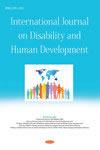Psychological and emotional state of parents having intellectually and developmentally disabled children
International Journal on Disability and Human Development
Pub Date : 2016-08-01
DOI:10.1515/ijdhd-2015-0016
引用次数: 2
Abstract
Abstract Background: A family is a functional unit that comprises of a set of individuals that provide each other with a sense of belonging, identity and a secure environment for its members, allowing them to support each other emotionally, financially and socially. A disability in the family has the potential to disrupt the proper functioning of a family. Objectives: The main objective of this study is to know the mental and emotional condition of parents of children with intellectual and developmental disability (IDD) and to show the common view of parents towards the condition in their children. Methods: The study was conducted based on two levels. The first level involves one to one interviews with parents of 53 children attending a special school in the Coimbatore district of Tamil Nadu state in India and was followed by a second level of the study which involved group discussions. Results: Among all the IDDs only Down syndrome can be recognized at the birth. Parents of a mentally disabled daughter have their fears further compounded. Due to such fears, parents have reported covering their daughter’s identity in public and have thought about the removal of their daughter’s reproductive organs. Conclusion: To avoid mismanagement of the child’s condition, basic medical training of the parents becomes imperative and they should be educated on the reproductive rights of daughters. Hence a holistic approach involving addressing the psychological, medical and financial issues facing affected families is necessary to bring about the healthy development of the IDD child.智力和发育障碍儿童父母的心理和情绪状态
背景:家庭是一个功能单位,由一组个体组成,这些个体为其成员提供归属感、身份和安全的环境,使他们能够在情感上、经济上和社会上相互支持。家庭中的残疾有可能破坏家庭的正常运作。目的:本研究的主要目的是了解智力与发育障碍(IDD)儿童家长的心理和情绪状况,并显示家长对儿童智力与发育障碍的共同看法。方法:本研究分为两个层次。第一阶段是对在印度泰米尔纳德邦哥印拜陀地区一所特殊学校上学的53名儿童的父母进行一对一的访谈,随后是第二阶段的研究,涉及小组讨论。结果:在所有idd中,只有唐氏综合征能在出生时被识别出来。父母有一个智障女儿,他们的恐惧进一步加剧。由于这种恐惧,父母们纷纷报道在公共场合掩盖女儿的身份,并考虑切除女儿的生殖器官。结论:为避免对孩子的病情管理不当,必须对父母进行基本的医学培训,并对他们进行女儿生殖权利的教育。因此,有必要采取综合办法,解决受影响家庭面临的心理、医疗和经济问题,以实现缺碘症儿童的健康发展。
本文章由计算机程序翻译,如有差异,请以英文原文为准。
求助全文
约1分钟内获得全文
求助全文

 求助内容:
求助内容: 应助结果提醒方式:
应助结果提醒方式:


